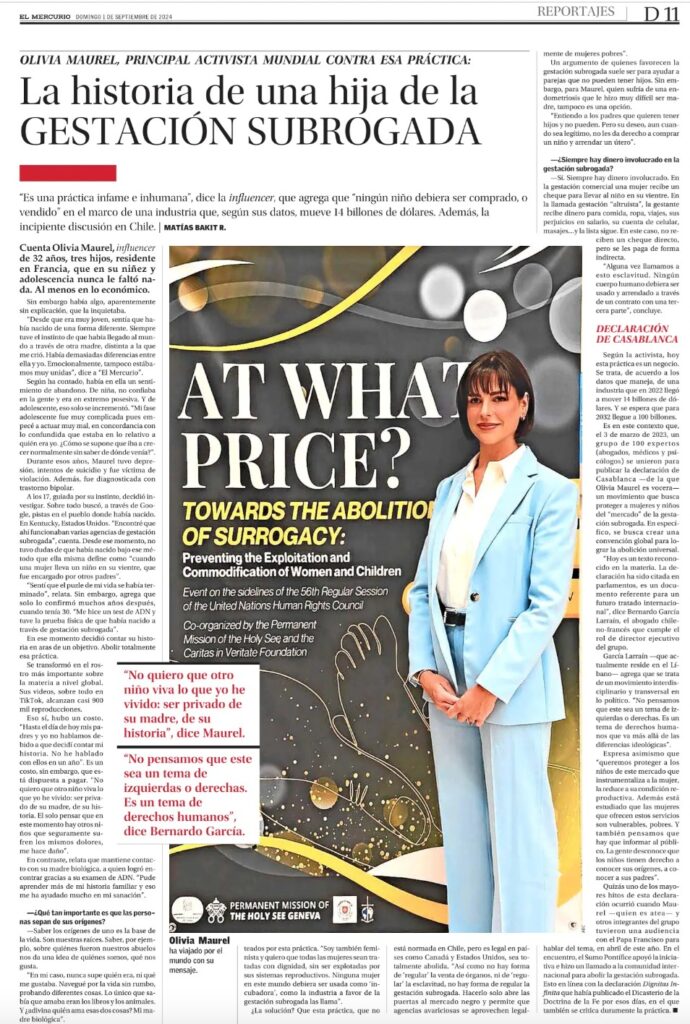Press release 09.09.2024
On Sunday 8 September, 8 Chilean MPs from 8 different parties, from the left, centre and right, signed a public letter in the chilean newspaper El Mercurio, inspired by the testimony of Olivia Maurel, born of surrogacy and spokesperson for the Casablanca Declaration, interviewed in El Mercurio a few days earlier. Noting that ‘Olivia and her mother have both been treated like things, and that the onerous nature of the pact in question is irrelevant’, the MPs affirm their conviction that ‘surrogacy is contrary to fundamental principles of international law, such as the best interests of the child and the right to identity of origin’. Recalling that ‘Chile was a pioneer in the abolition of slavery’, they hope that their country ‘will not lag behind in this struggle, which is just as important, if not more so, and that it will make up for lost time not only with abolitionist legislation, but also by leading this fight at international level’. You can read here (English traduction below) the interview with Olivia, who tells her story of being the daughter of a surrogate mother and now campaigning for the abolition of surrogacy worldwide with the Déclaration of Casablanca for the universal abolition of surrogacy. The request, signed by MPs from many parties, shows that it is possible to unite a lot of people around the goal of abolishing surrogacy, and as they say in conclusion: ‘Those of us who have signed this letter are proof that there is a chance’. |
Letter signed by 8 Chilean MPs from 8 different partiesPublished in El Mercurio on 8 September 2024 (original text in Spanish below) Dear Editor Following the crude testimony of Olivia Maurel in last Sunday’s Reportajes of ‘El Mercurio’, regarding her experience as a surrogate daughter, it is worth reflecting that both Olivia and her mother were treated as things, the onerousness of the pact in question being irrelevant. At the end of the day, both commercial surrogacy and so-called altruistic surrogacy lead to the same thing: the instrumentalisation of the woman and the child to satisfy the wishes of third parties. And some of them with a profit motive, as altruistic surrogacy has become a disguise for this enslaving market. Just look at the clinics that operate behind it and that profit from this tragedy in the same way, with no regard, once again, for either the mother or the child. That is why this surrogacy is contrary to the fundamental principles of international law which are also in force in Chile, such as the best interests of the child and the right to identity of origin. Chile was a pioneer in the abolition of slavery, let us hope that it does not lag behind in this struggle, which is equally or even more important, and that it makes up for lost time not only with abolitionist legislation, but also by leading this battle at the international level. Those of us who have signed this letter show that there is an opportunity’. |

El mercurio (traduction) Olivia MAUREL : The story of a girl from surrogacyOlivia Maurel, a 32-year-old influencer with three children, living in France, says that in her childhood and adolescence she never lacked anything. At least financially. However, there was something, apparently without explanation, that worried her. “Since I was very young, I felt that I had been born in a different way. I always had the instinct that I had come into the world through another mother, different from the one who raised me. There were too many differences between her and me. Emotionally, we were not very close either,” she says to “El Mercurio.” According to her, there was a feeling of abandonment in her. As a child, she did not trust people and was extremely possessive. And as a teenager, that only increased. “I had more connection with my father, but I was raised mainly by nannies. My teenage phase was very complicated because I began to act very badly in accordance with how confused I was about who I was. How was I supposed to grow up normally without knowing where I came from? We all need to know our family history to have solid foundations. But that wasn’t my case.” During those years, Maurel suffered from depression, suicide attempts and was a victim of rape. In addition, she was diagnosed with bipolar disorder. At 17, guided by her instinct, she decided to investigate. Above all, she searched through Google for clues in the town where she was born. In Kentucky, United States. “I found that there were several surrogacy agencies operating there,” she says. From that moment on, she had no doubt that she had been born under that method that she herself defines as “when a woman carries a child in her womb, who was commissioned by other parents.” “I felt that the puzzle of my life had been completed,” she says. However, she adds that she only confirmed it many years later, when she was 30. “I took a DNA test and had physical proof that I had been born through surrogacy.” At that moment she decided to tell her story for the sake of a goal: to completely abolish that practice. She became the most important face on the subject globally. Her videos, especially on Tik Tok, reach almost 900 thousand views. Of course, there was a cost. “To this day my parents and I do not speak because I decided to tell my story. I have not spoken to them in a year.” It is a cost, however, that she is willing to pay. “I do not want another child to live what I have experienced: being deprived of their mother, of their story. Just thinking that at this moment there are other children who surely suffer the same pain, hurts me.” She also expresses that, although there are no studies on the subject, she has spoken with many people born through surrogacy and several “have suffered from severe identity crises. Many have or have had mental health illnesses, addictions and post-traumatic stress.” However, she adds that many do not dare to tell their story for fear of their parents’ reaction. “I understand them. I spoke and I lost them.” In contrast, she says that she maintains contact with her biological mother, whom she managed to find thanks to her DNA test. “I was able to learn more about my family history and that has helped me a lot in my healing.”
-How important is it for people to know about their origins? -Knowing one’s origins is the basis of life. They are our roots. Knowing, for example, who our grandparents were gives us an idea of who we are, what we like. It can also show us our predispositions. For example, my daughter, who is six years old, loves art and embroidery, since she was very little. It is something that, I knew, comes from my husband’s side, because her sister is a seamstress, as were her two grandmothers. So, I know that was inherited by her. “In my case, I never knew who I was, or what I liked. I navigated through life aimlessly, trying different things. The only thing I knew I loved were books and animals. And guess who loves those two things? My biological mother.” For abolitionFor Maurel there are no possible arguments in favor of surrogacy. And she is in charge of communicating this around the world and through her networks “It is an infamous and inhuman practice. We are, with full knowledge, creating children to fulfill the selfish desires of adults who want to have a perfect baby at any price. We are, on purpose, tearing children from their mothers, systematically creating traumas of abandonment that will arise at some stage in the child’s life. We are making children into sacrifices for some adults. Also, no child should be selected based on their sex, hair color, or eye color. It is totally unethical. And finally, no child should be bought or sold.” Her claim also points to women’s rights which, in her opinion, are being trampled on by this practice. ‘I am also a feminist and I want all women to be treated with dignity, without being exploited for their reproductive systems. No woman in this world should be used as an ‘incubator’, as the surrogacy industry calls them’. The solution? That this practice, which is not regulated in Chile but is legal in countries such as Canada and the United States, be abolished altogether. ‘Just as there is no way to ‘regulate’ the sale of organs, nor to ‘regulate’ slavery, there is no way to regulate surrogacy. Doing so only opens the door to the black market and allows greedy agencies to take legal advantage of poor women. This year we have seen it in Greece, where ‘altruistic’ surrogacy is legal: 160 women were illegally trafficked from poor countries, to be forced to produce children for other parents’. Couples who cannot have childrenOne argument of those who favour surrogacy is often to help couples who cannot have children. However, for Maurel, surrogacy is not an option either. ‘I understand parents who want to have children and can’t. They have to deal with that pain. They have to deal with that pain, which is very difficult, but it can be overcome with medical treatment and psychological help. Their desire, even if it is legitimate, does not give them the right to buy a child and rent a womb. It must be remembered: there is no right to have children. However, children and women do have rights. -Is there always money involved in surrogacy?-Yes, there is ALWAYS money involved. In commercial gestation a woman receives a cheque to carry the child in her womb. In so-called ‘altruistic’ gestational surrogacy, the surrogate receives money for food, clothes, travel, her damages in salary, her mobile phone bill, massages…and the list goes on. In this case, they do not receive a direct cheque, but are paid indirectly. We know, moreover, that in many cases there are under-the-table exchanges. ‘We once called this slavery. No human body should be used and leased through a contract with a third party,’ she concludes. Casablanca DeclarationAccording to the activist, today this practice is a business. According to her data, it is an industry that in 2022 reached a turnover of 14 billion dollars. And it is expected to reach 100 billion dollars by 2032. It is in this context that, on 3 March 2023, a group of 100 experts (lawyers, doctors and psychologists) came together to publish the Casablanca Declaration – for which Olivia Maurel is the spokesperson – a movement that seeks to protect women and children from the surrogacy ‘market’. Specifically, it seeks to create a global convention to achieve universal abolition. ‘Today it is a recognised text on the subject. The declaration has been cited in parliaments, it is a reference document for a future international treaty,’ says Bernardo García-Larraín, the Chilean-French lawyer who serves as the Group’s Executive Director. García-Larraín, who is currently based in Lebanon, adds that it is an interdisciplinary and politically cross-cutting movement. ‘We don’t think this is a left-wing or right-wing issue. It is a human rights issue that goes beyond ideological differences. We want to protect children from this market that instrumentalises women and reduces them to their reproductive condition. Moreover, it has been studied that the women who offer these services are vulnerable and poor. And we also think that the public needs to be informed. People don’t know that children have the right to know their origins, to know their parents. Or that in the EU the exploitation of surrogacy has been criminalised as human trafficking. It should be clear to countries that this should be illegal. But in many countries, like Chile, it is not specified. Perhaps one of the biggest milestones in this statement came when Maurel – who is an atheist – and other members of the group had an audience with Pope Francis to discuss the issue in April this year. At the meeting, the Pope supported the initiative and called on the international community to abolish surrogacy. This was in line with the statement ‘Dignitas Infinita’ published by the Dicastery for the Doctrine of the Faith at the time. |


